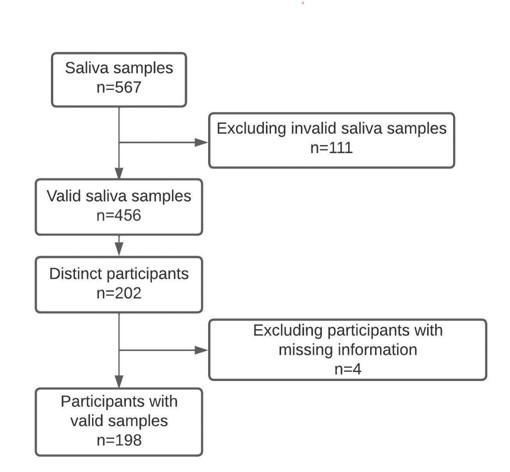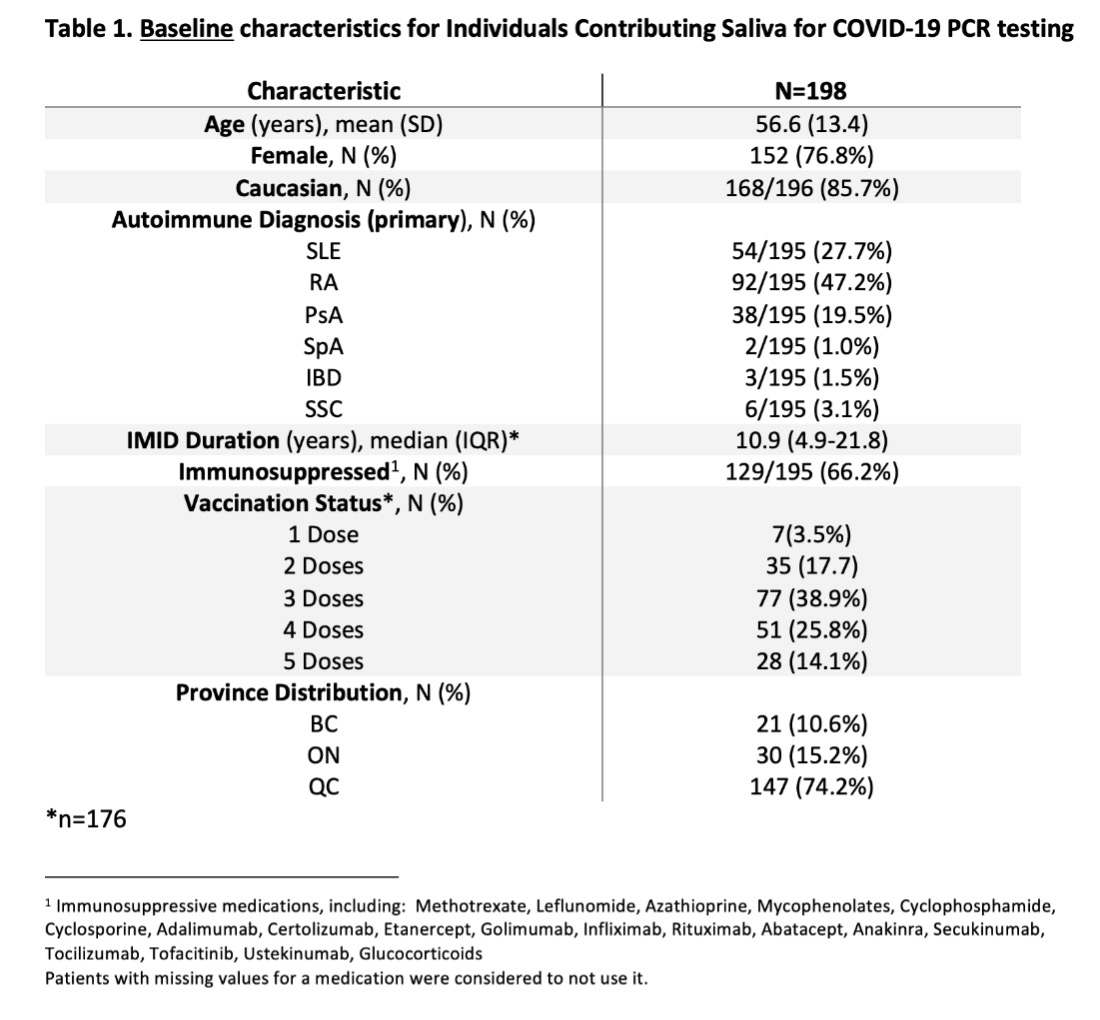Session Information
Session Type: Poster Session A
Session Time: 9:00AM-11:00AM
Background/Purpose: Breakthrough COVID-19 infections are still a risk after vaccination and may be more common in patients with immune-mediated inflammatory diseases (IMIDs) than in the general population. Previous studies on breakthrough infections in IMID relied on retrospective databases; however, these are subject to limitations on COVID-19 test availability, making it hard to determine true infection prevalence as asymptomatic cases may have gone untested. We performed active surveillance of breakthrough COVID-19 infections, analyzing saliva samples via quantitative polymerase chain reaction (qPCR) in vaccinated individuals with IMIDs (systemic lupus erythematosus, rheumatic arthritis, psoriatic arthritis, spondylarthritis, inflammatory bowel disease, and scleroderma).
Methods: Adults with IMID were recruited from Canadian clinics and registries between September 2022 and March 2023 and asked to self-collect saliva samples monthly. Samples underwent batch qPCR testing, with each sample being tested twice, to qualitatively detect SARS-CoV-2 nucleic acids indicators (N1 and N2).
Results: To date, 202 patients have been enrolled, providing 458 valid samples (Fig. 1, Table 1). Most (66.2%) were on immunomodulatory medications, and the majority (78.8%) had received 3 or more vaccine doses. Only 5% of participants (n=10/202) met the N1 and N2 thresholds required to confirm COVID-19 positivity. Given the small number of positive results, we were unable to ascertain significant differences between demographic factors, including age, sex, immunosuppression, or vaccination status. However, participants who tested positive had a median time since their last vaccination that was considerably longer (278 days) than those who tested negative (165 days) (95% CI for difference,18-205). The majority (three-quarters) of positive saliva samples occurred in patients who were beyond 217 days of their last vaccine.
Conclusion: A 5% COVID-19 breakthrough infection rate aligns with a Canadian population-based cohort where breakthrough infections occurred in 5.4%-6.5% of fully vaccinated IMID patients (1). In our sample, those with breakthrough infections had a longer median time since vaccination (by 112 days), corroborating the currently held belief that protection against COVID wanes in the 3-4 months post-vaccination and beyond. Most infections occurred 7-8 months after the last vaccine dose. These findings will help patients, clinicians, and other stakeholders with decision-making in 2023-2024 and beyond.
Reference
- Widdifield J, Kwong JC, Chen S, Eder L, Benchimol EI, Kaplan GG, et al. Vaccine effectiveness against SARS-CoV-2 infection and severe outcomes among individuals with immune-mediated inflammatory diseases tested between March 1 and Nov 22, 2021, in Ontario, Canada: a population-based analysis. The Lancet Rheumatology [Internet]. 2022 Apr 14; Available from: https://www.ncbi.nlm.nih.gov/pmc/articles/PMC9009845/
To cite this abstract in AMA style:
Tan J, Avina-Zubieta J, Lee J, Fortin P, Colmegna I, Gonzalez Arreola L, Berger C, Larche M, Hitchon C, Richards D, Lalonde N, Bernatsky S. When Should I Get My Next Booster? Active Surveillance of COVID-19 Breakthrough Infections in Canadian Patients with Immune-Mediated Inflammatory Diseases [abstract]. Arthritis Rheumatol. 2023; 75 (suppl 9). https://acrabstracts.org/abstract/when-should-i-get-my-next-booster-active-surveillance-of-covid-19-breakthrough-infections-in-canadian-patients-with-immune-mediated-inflammatory-diseases/. Accessed .« Back to ACR Convergence 2023
ACR Meeting Abstracts - https://acrabstracts.org/abstract/when-should-i-get-my-next-booster-active-surveillance-of-covid-19-breakthrough-infections-in-canadian-patients-with-immune-mediated-inflammatory-diseases/


